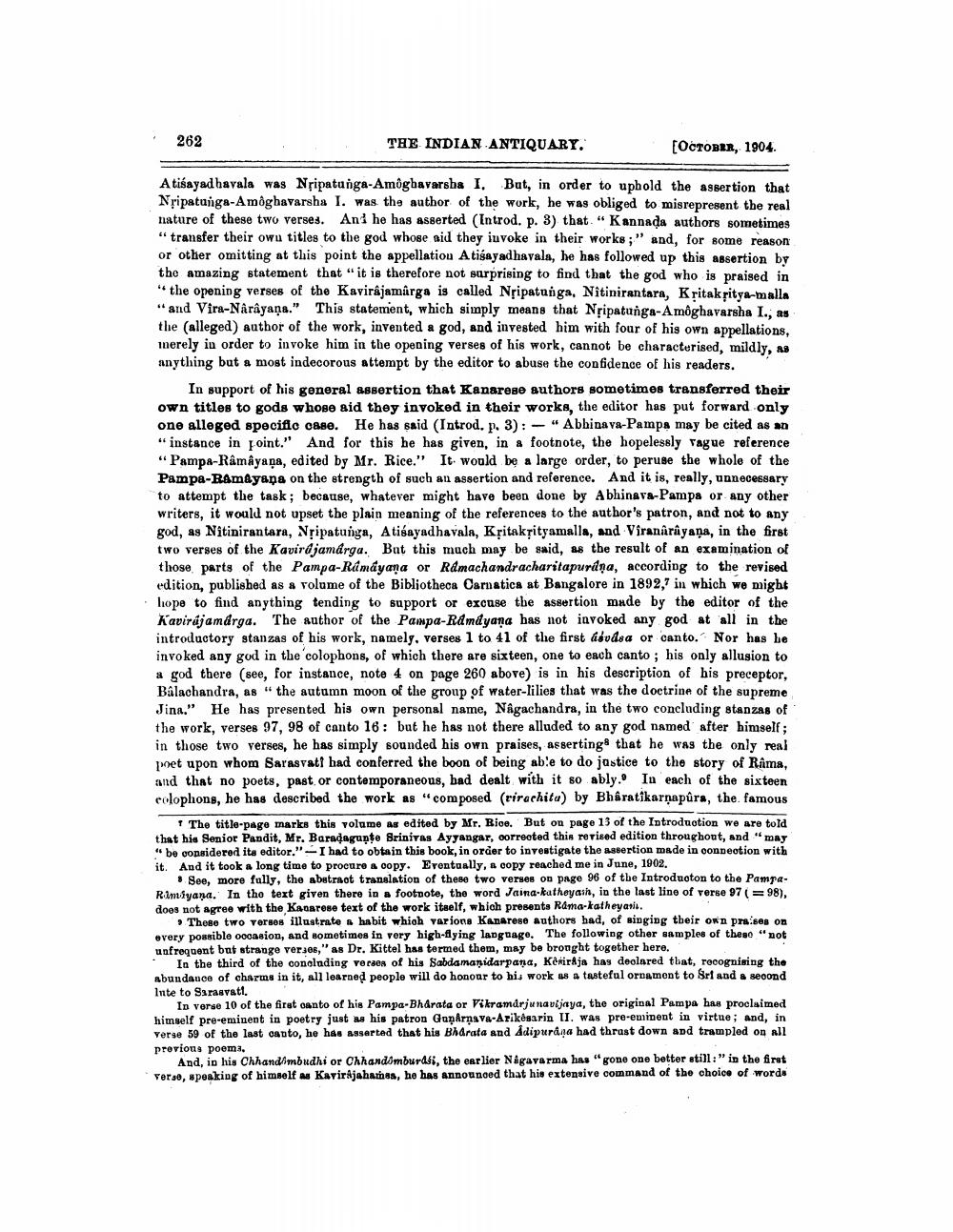________________
262
THE INDIAN ANTIQUARY.
[OCTOBER, 1904.
A tisayad havala was Nřipatunga-Amoghavarsha I. But, in order to uphold the assertion that Nripatunga-Amoghavarsha I. was the author of the work, he was obliged to misrepresent the real nature of these two verses. And he has asserted (Introd. p. 8) that. "Kannada authors sometimes "transfer their owu titles to the god whose aid they invoke in their works;" and, for some reason or other omitting at this point the appellatiou Atiśayadhavala, he has followed up this assertion by the amazing statement that "it is therefore not surprising to find that the god who is praised in ** the opening verses of the Kavirajamärga is called Nripatunga. Nitinirantara, Kritaksitya-malla " and Vira-Narayana." This statement, which simply means that Nripatunga-Amôghavarsha I., as the alleged) author of the work, invented a god, and invested him with four of his own appellations, inerely in order to invoke him in the opening verses of his work, cannot be characterised, mildly, as anything but a most indecorous attempt by the editor to abuse the confidence of his readers.
In support of his general assertion that Kanarese authors sometimes transferred their own titles to gods whose aid they invoked in their works, the editor has put forward only one alleged specific case. He has said (Introd. p. 3): - "Abbinava-Pamps may be cited as an "instance in point." And for this he has given, in a footnote, the hopelessly vague reference " Pampa-Ramayana, edited by Mr. Rice." It would be a large order, to peruse the whole of the Pampa-Ramdyana on the strength of such an assertion and reference. And it is, really, unnecessary to attempt the task; because, whatever might have been done by Abhinava-Pampa or any other writers, it would not upset the plain meaning of the references to the author's patron, and not to any god, as Nîtinirantara, Nripatunga, Atisayadhavala, Křitaksityamalla, and Viranârûyaņa, in the first two verses of the Kavirajamarga. Bat this much may be said, as the result of an examination of those parts of the Pampa-Ramayana or Ramachandracharitapurana, according to the revised edition, published as a volume of the Bibliotheca Carnatica at Bangalore in 1892,7 in which we might hope to find anything tending to support or excuse the assertion made by the editor of the k'avirájamdrga. The author of the Pampa-Ramdyana has not invoked any god at all in the introductory stanzas of his work, namely, verses 1 to 41 of the first asvdsa or canto. Nor has be invoked any god in the colophons, of which there are sixteen, one to each canto; his only allusion to a god there (see, for instance, note 4 on page 260 above) is in his description of his preceptor, Balachandra, as "the autumn moon of the group of water-lilies that was the doctrine of the supreme Jina." He has presented his own personal name, Någachandra, in the two concluding stanzas of the work, verses 97, 98 of canto 16: but he has not there alluded to any god named after himself ; in those two verses, he has simply sounded his own praises, asserting that he was the only real poet upon whom Sarasvati had conferred the boon of being able to do justice to the story of Rama, and that no poets, past or contemporaneous, bad dealt with it so ably. In each of the sixteen colophons, he has described the work as "composed (rirachita) by Bharatikarnapûrs, the famous
T The title-page marks this volume as edited by Mr. Bioe. But on page 13 of the Introduction we are told that his Senior Pandit, Mr. Baradagupte Srinivas Ayyangar, corrected this revised edition throughout, and "may "be gonsidered ita editor." - I had to obtain this book, in order to investigate the assertion made in connection with it. And it took a long time to procure a copy. Eventually, a copy reached me in June, 1902.
. See, more fully, the abstract translation of these two verses on page 96 of the Introduoton to the PampaRamayana. In tho text given there in a footnote, the word Jaina-kathayath, in the last line of verse 97 ( 98). does not agree with the Kacarese text of the work itself, which presents Rama-katheyaris.
Those two versos illustrate a habit which variona Kadarese authors had, of singing their own praises on every possible occasion, and sometimes in very high-flying language. The following other samples of these "not unfrannant but strange ver306," as Dr. Kittel has termed them, may be brought together here.
In the third of the conoluding verson of his Sabda manidarpana, Kekirija has deolared that, rocognising the Abundance of charms in it, all learned people will do honour to his work as a tasteful ornament to Srl and a second Inte to Sarasvatt. "
In verse 10 of the first oanto of his Pampa-Bharata or Vikramdrjuna vijaya, the original Pampa has proclaimed himself pre-eminent in poetry just as his patron Gunirnava-Arikesarin II. was pre-eminent in virtue; and, in Verse 59 of the last canto, he has agserted that his Bharata and Adipurana had thrast down and trampled on all previous poema.
And, in his Chhandómbudhi or ChhandAmburds, the earlier Någavarma has gone one better still:" in the first verso, apoaking of himself w Kavirajahamas, he has announced that his extensive command of the choice of words




